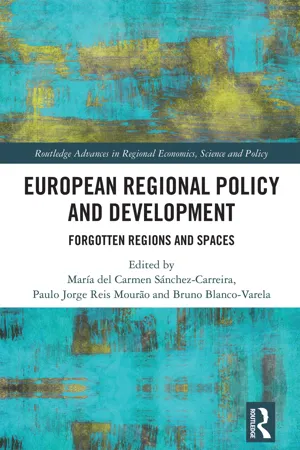
European Regional Policy and Development
Forgotten Regions and Spaces
- 232 pages
- English
- ePUB (mobile friendly)
- Available on iOS & Android
European Regional Policy and Development
Forgotten Regions and Spaces
About this book
The shortcomings of traditional regional policies led to a major policy. Thus, regions have become more active in the design and implementation of policies, following a bottom-up approach and involving the participation of the local community in strategic planning, as opposed to the traditional top-down method. This book addresses regional development theories and policies, with a special focus on forgotten places, and raises emerging questions about recent theoretical advances, as well as trends and challenges in the field.
It examines two main and related issues: the crucial role of regional actors for development and the role of Forgotten Spaces. It emphasizes the spatial/territorial approaches from different theoretical perspectives, underlining place-based approaches and compares the experiences of both successful and failed cases, attempting to identify lessons and policy recommendations, as well as adding empirical evidence to this field. The different cases presented, which focus on Forgotten Spaces, allow the reader to assess the role of different actors for regional development as well as some sectoral approaches. While there is a clear focus on European countries with different geographical, institutional and sociocultural characteristics, the book also examines good and bad examples of regional development and policies related to forgotten places from different regions worldwide, including developed and developing countries.
The book benefits from contributions from over 20 authors from different nationalities, and a rich diversity of case studies, approaches and methods of discussion. The authors discuss practical examples and more complex theoretical approaches, involving techniques of spatial analysis, spatial econometrics, social networks, content analysis as well as regional planning techniques. The book will appeal to an interdisciplinary audience and will provide academicians, politicians, and policy designers with original and detailed analyses.
Frequently asked questions
- Essential is ideal for learners and professionals who enjoy exploring a wide range of subjects. Access the Essential Library with 800,000+ trusted titles and best-sellers across business, personal growth, and the humanities. Includes unlimited reading time and Standard Read Aloud voice.
- Complete: Perfect for advanced learners and researchers needing full, unrestricted access. Unlock 1.4M+ books across hundreds of subjects, including academic and specialized titles. The Complete Plan also includes advanced features like Premium Read Aloud and Research Assistant.
Please note we cannot support devices running on iOS 13 and Android 7 or earlier. Learn more about using the app.
Information
Table of contents
- Cover
- Half Title
- Series
- Title
- Copyright
- Contents
- List of figures
- List of tables
- Authors
- Acknowledgments
- Introduction: Forgotten Spaces in the European regional policy and development
- Part I Regional development and policies in Europe: main theoretical advances and last trends and challenges
- Part II Comparative analysis of regional experiences on Forgotten Spaces in Europe
- Index